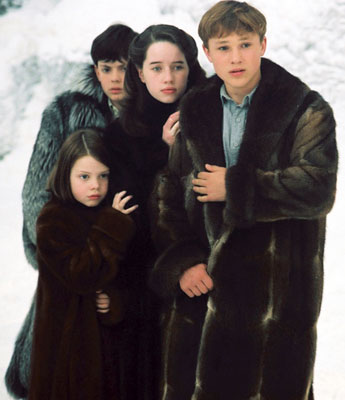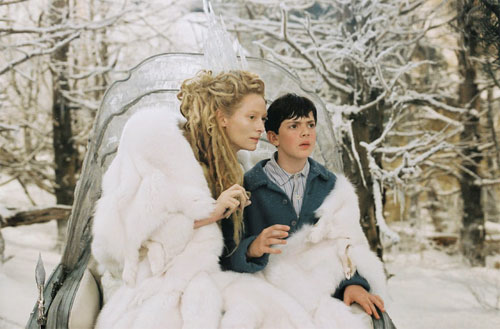The Chronicles of Narnia: The Lion, The Witch, and The Wardrobe (2005)
DIRECTOR: Andrew Adamson
CAST:
William Moseley, Anna Popplewell, Georgie Henley, Skandar Keynes, Tilda Swinton, James McAvoy, Jim Broadbent
voices:
Liam Neeson, Rupert Everett, Ray Winstone, Dawn French, Michael Madsen
REVIEW:
It’s no secret that the massive success and critical acclaim of The Lord of the Rings and run-away Harry Potter mania have revived the fantasy genre as a viable and fertile ground in the eyes of many, and their popularity has inspired any number of films, mostly also adaptations of popular books, to aspire to their heights, but none have managed it. Many of these are inferior flash-in-the-pan wannabes like The Spiderwick Chronicles and Eragon. The Chronicles of Narnia: The Lion, The Witch, and The Wardrobe, an adaptation of the first in C.S. Lewis’ beloved seven-book series, has a more respectable pedigree than that, but it’s unlikely to threaten Rings or Potter for a few reasons. One, far more so than The Lord of the Rings, and in my opinion more exclusively than Harry Potter, Narnia was deliberately written for and intended for children. The books are pleasant and lightly charming and one gets the sense reading them that they were written by a warm-hearted individual, but there is also an awareness of who the target audience is. There is nothing in Narnia with the epic scope and depth of The Lord of the Rings (nor, to be fair, does it aspire toward it), and while it is a somewhat closer cousin to Harry Potter, the Potter series, at least in my opinion, (which will sound blasphemous to some) offers a more fleshed-out and detailed storyline and more character development than the noticeably watered-down and unambitious Narnia stories.
 At the height of the Blitz, the Pevensie children- Peter (William Moseley), Susan (Anna Popplewell), Lucy (Georgie Henley), and Edmond (Skandar Keynes) are evacuated from London to the countryside estate of the mysterious Professor Kirke (Jim Broadbent). While playing hide-and-seek in the massive mansion, young Lucy- eventually followed by her siblings- enters a wardrobe which turns out to be a secret passageway into the world of Narnia, a magical land populated by fauns, centaurs, griffins, and talking animals, held in the grip of a hundred-year winter due to the rule of the White Witch (a perfectly-cast Tilda Swinton), who fears a prophecy foretelling her downfall at the hands of ‘four sons of Adam and daughters of Eve’ allied with the lion Aslan (voice of Liam Neeson), the rightful King of Narnia.
At the height of the Blitz, the Pevensie children- Peter (William Moseley), Susan (Anna Popplewell), Lucy (Georgie Henley), and Edmond (Skandar Keynes) are evacuated from London to the countryside estate of the mysterious Professor Kirke (Jim Broadbent). While playing hide-and-seek in the massive mansion, young Lucy- eventually followed by her siblings- enters a wardrobe which turns out to be a secret passageway into the world of Narnia, a magical land populated by fauns, centaurs, griffins, and talking animals, held in the grip of a hundred-year winter due to the rule of the White Witch (a perfectly-cast Tilda Swinton), who fears a prophecy foretelling her downfall at the hands of ‘four sons of Adam and daughters of Eve’ allied with the lion Aslan (voice of Liam Neeson), the rightful King of Narnia.
The Chronicles of Narnia is simple, straightforward fantasy geared towards children and parents who want something tolerable to watch with their children. Its tone is often juvenile, and events feel covered in a perfunctory manner; there is certainly nothing here that holds a candle to the depth and scope of The Lord of the Rings– probably the pinnacle of fantasy adventure- but many viewers are likely to find Narnia entertaining, if not always enthralling. Some scenes- such as the first entry into the wardrobe- create a sense of magic and wonder. Others- such as the opening scene of the Blitz- are visually striking and exciting. A couple scenes may even be too intense for very young viewers. And still others- most notably a brief encounter with Father Christmas- are childish.
 Of the main quartet- William Moseley, Anna Popplewell, Georgie Henley, and Skandar Keynes- only Anna Popplewell has a previous résumé. Like many inexperienced young actors, they are enthusiastic but not polished, and while there are moments when they come across weakly, there are others where they are good (Moseley, something of a budding teen heartthrob, is arguably the weakest actor, while the youngest, Henley, is arguably the best). The standout is Tilda Swinton, who is splendid as the White Witch, making her a suitably sinister and venomous character. In fact, Swinton is about as intimidating a villain as a juvenile-oriented, PG movie is going to have. This is one icy woman; her malicious glare could shoot a man dead at ten paces. And although only his voice is present, Liam Neeson brings wisdom, dignity, and authority to Aslan. Also providing vocal talents are Rupert Everett (as The Fox), Michael Madsen (as the wolf Maugrim, the Witch’s chief of secret police) and Ray Winstone and Dawn French (as The Beavers). Jim Broadbent’s part amounts to basically a cameo, and the British character actor is nearly unrecognizable (Broadbent is gaining some experience playing professors in fantasy films; he’ll soon be seen as Professor Slughorn in Harry Potter and the Half-Blood Prince).
Of the main quartet- William Moseley, Anna Popplewell, Georgie Henley, and Skandar Keynes- only Anna Popplewell has a previous résumé. Like many inexperienced young actors, they are enthusiastic but not polished, and while there are moments when they come across weakly, there are others where they are good (Moseley, something of a budding teen heartthrob, is arguably the weakest actor, while the youngest, Henley, is arguably the best). The standout is Tilda Swinton, who is splendid as the White Witch, making her a suitably sinister and venomous character. In fact, Swinton is about as intimidating a villain as a juvenile-oriented, PG movie is going to have. This is one icy woman; her malicious glare could shoot a man dead at ten paces. And although only his voice is present, Liam Neeson brings wisdom, dignity, and authority to Aslan. Also providing vocal talents are Rupert Everett (as The Fox), Michael Madsen (as the wolf Maugrim, the Witch’s chief of secret police) and Ray Winstone and Dawn French (as The Beavers). Jim Broadbent’s part amounts to basically a cameo, and the British character actor is nearly unrecognizable (Broadbent is gaining some experience playing professors in fantasy films; he’ll soon be seen as Professor Slughorn in Harry Potter and the Half-Blood Prince).
Lewis’ Narnia stories are watered-down, clear-cut, simple fantasy aimed at children. The movie is faithful to that vision, but that makes what it has to offer for wider audiences a mixed bag. The most poignant event is handled in a serious, mature manner which is sometimes lacking at other points of the film, and some eyes may not be dry, particularly those of young viewers. In fact, this scene may be a little intense for small children. It is also here that Tilda Swinton relishes her best opportunity to be genuinely frightening. On the other hand, there are occasions when the filmmakers try to expand on the story to make it more “exciting”, particularly in the climactic battle, but their approach is flawed. Lewis mostly skimmed over the battle. The filmmakers have created a large-scale battle which screams Lord of the Rings wannabe, but plays like a Cliff Notes version. Narnia‘s battle has a lot of special effects, but it’s sanitized so that our young heroes never get any blood on their swords. It’s understandable that the filmmakers wanted to expand the climactic battle to play better onscreen, but if they were going to expand it, they should have gone all the way, instead of throwing a lot of time and money at a large-scale battle but carefully avoiding any hint of anything that could push the PG rating. As it is, the climactic conflict comes across like the abridged, G-rated version of a Lord of the Rings battle, and the comparison does Narnia no favors.
Narnia is entertaining but not enthralling, and there is a watered-down, juvenile, perfunctory tone here, and the movie lacks the depth and fleshing-out to make it more than mildly diverting entertainment (for that matter, this same statement could be made about C.S. Lewis’ lightly charming but somewhat shallow and underdeveloped books, so maybe the filmmakers made the most that they could out of the source material). If the filmmakers were hoping to make The Chronicles of Narnia into a film franchise to rival the massive popularity of The Lord of the Rings or Harry Potter, I don’t see it happening, unless the second installment, Prince Caspian, does a few things differently.
**1/2